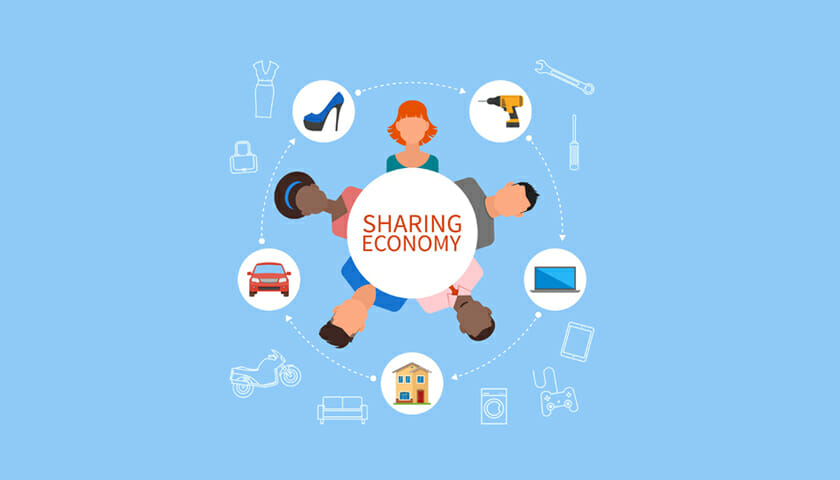How the sharing economy is changing business
For many of us, owning something is a mark of achievement. Well, enter the Sharing Economy.
It’s aspirational. A house, a car, our clothes, etc, etc. There is however a growing number of people who don’t put the same value on this way of life. Renting, once considered the poor relation, is now being taken very seriously as a credible alternative.
So, what’s the name given to this alternative way?
It’s the sharing economy.
It’s defined as a peer-to-peer (P2P) based method of acquiring, providing, or sharing access to goods and services that is often enabled by a community-based online platform.
Didn’t your parents teach you share?
This means, if you have a leaf blower or a car that is sat idle most of the time, other people could rent it from you. Parents have been asking us to share our things for hundreds of years but making it a business is still a relatively new concept.
It’s a growing movement, with real positives for those who don’t have the money to buy or don’t have the space to store things. And for entrepreneurs, there are endless opportunities to dip your toe into the sharing economy water.
But there are also questions around legislation and safety, which need to be considered.
Why is the sharing economy growing?
There are a number of reasons why people are turning to borrowing or renting over buying.
It can be cheaper – Instead of buying something which is going to depreciate and not get used very often, you can rent it from someone else. There are already a number of car maintenance service businesses out there which enable you to rent a car lift in a building for an hour, a day or longer for example.
You can get the latest technology – Having the very latest gadgets and technology is all very well but while your camera is sitting in the cupboard it gradually becomes obsolete as it is superseded by better versions. If you like to have a top-notch camera but only use it once or twice a year, why not consider renting one?
We never have enough storage – In any home, whether you own it or rent it, having plenty of storage is up there on our list of requirements. If you want to entertain for a birthday dinner but don’t have the space to keep full dinner sets and glasses, then rent them when you need them.
Recycle and re-use – The battle to save the planet is certainly on and cutting back on what we waste is important. We’re being encouraged to buy less and waste less, so if you can borrow something or share it with others, it’s going to help the environment.
What does the sharing economy mean for business?
1. Products
If you own your own business, the trick is finding out if what you are producing can be sold in a different way. If you own a clothes shop for example, could you offer a rental service that allows people to rent a dress, suit or bag for a couple of days?
Even furniture manufacturers are beginning to realise that there is a need to reduce the amount of furniture that ends up in landfill.
Furniture is the third largest outlay behind a home and a car, so if you make dining tables and chairs, consider offering a rental option alongside a purchase scheme. Customers could choose between a few different tables and chairs and pay to rent them for six months or a year. Then at the end of the rental period, you take them back, do necessary repairs and get them ready for the next person.
2. Services
But what if you don’t actually make anything. Can the sharing economy still work for you?
Absolutely!
Maybe you already own land that can be rented out for parking spaces when you don’t need it. If you have unwanted office space, consider renting out a desk or two to another business or freelancers. If you are out at work all day, provided you can make it secure you could now rent out some of your living space for people to use as an office for the day.
In the construction industry, a company could even choose to rent its machinery out to a competitor company. This practice should improve productivity and reduce build costs. There may be issues if there is strong rivalry; with one firm feeling they are getting the poor deal on purpose if they get offered unfavourable borrowing terms. But if the culture changes and it becomes the norm or there is legislation to prevent these unfair terms, then it could still be a viable option.
If you own a café or a restaurant, you could set up a scheme which allows you and other local eateries to swap extra vegetables or ingredients that you can’t use for some that you can.
The result? Less waste and more tasty creations!
But is this sharing thing really just a phase?
With the strong buying power of Millennials and Generation Z, it’s hard to see how this sharing economy thing is just a phase.
Back in 2014, a report predicted that the sharing economy could generate £9bn of revenue by 2025. We’ll have to wait and see if that’s the case but the movement of buying less and sharing more is growing.
Clearly you still need to make the same checks before using a service or product that you would if you were purchasing them in the old-fashioned way but before you buy something, think about whether there is a possibility to borrow or rent it.
The options are endless.
Borrow a dog for a day, borrow a car or a lift to do repairs on it, a surfboard, suitcases or jewellery, work in someone’s spare office, or share your factory or kitchen with another business.
It’s all about sharing what you don’t need.
If you’re thinking of creating a business from this growing industry, then there are certainly plenty of options but as with any growing trend, an increasing amount of competition too.
Do you need to pay tax on what you earn?
It might sound like a silly question but have you considered whether you need to declare the money you make from renting out your driveway? What about if someone is renting a room as an office space?
And if you are sharing equipment with another business, will there be insurance implications?
A good accountant will be able to advise you on these questions and plenty of others related to the sharing economy.
Come and see us at one of our offices in Chelmsford, Sutton, Wanstead and Saffron Walden or give us a call.
About Mark Boulter
Mark Boulter is responsible for the efficient running of the firm’s infrastructure, and ensuring that THP delivers the best client service. Promoting the vision and culture across all branches, people are the key: “I like people who have a fresh approach and I’m happy for them to run with their ideas,” he says.
Communication across departments is crucial and Mark pioneers this. He ensure that people and departments not only talk to each other, but that they share ideas– whether they’re about marketing, finance, sales, strategy or any other topic that can result in us offering a better service. “I think helping to develop the next generation of THP people is essential to our success,” Mark adds. “We’ve a lot of talented people and our way of doing things increasingly attracts ambitious newcomers who are looking for a fresh approach. That’s good for us and even better news for our clients.”
More posts by Mark Boulter











